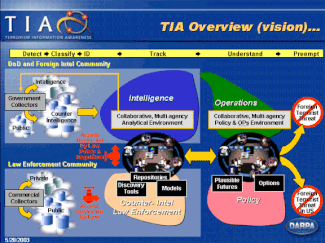

 National Security Agency surveillance |
|---|
 |
Total Information Awareness (TIA) was a mass detection program[clarification needed] by the United States Information Awareness Office. It operated under this title from February to May 2003 before being renamed Terrorism Information Awareness.[1][2]
Based on the concept of predictive policing, TIA was meant to correlate detailed information about people in order to anticipate and prevent terrorist incidents before execution.[3] The program modeled specific information sets in the hunt for terrorists around the globe.[4] Admiral John Poindexter called it a "Manhattan Project for counter-terrorism".[5] According to Senator Ron Wyden, TIA was the "biggest surveillance program in the history of the United States".[6]
Congress defunded the Information Awareness Office in late 2003 after media reports criticized the government for attempting to establish "Total Information Awareness" over all citizens.[7][8][9]
Although the program was formally suspended, other government agencies later adopted some of its software with only superficial changes. TIA's core architecture continued development under the code name "Basketball". According to a 2012 New York Times article, TIA's legacy was "quietly thriving" at the National Security Agency (NSA).[10]
- ^ Cite error: The named reference
dapra1was invoked but never defined (see the help page). - ^ Ryan Singel (14 June 2003). "Funding for TIA All But Dead". Wired. Retrieved 7 December 2013.
- ^ Murray, N. (4 October 2010). "Profiling in the age of total information awareness". Race & Class. 52 (2): 3–24. doi:10.1177/0306396810377002. S2CID 144001217.
- ^ MARKOFF, JOHN (November 9, 2002). "Pentagon Plans a Computer System That Would Peek at Personal Data of Americans". The New York Times. Retrieved 19 December 2013.
- ^ Shorrock, Tim (2008). Spies for Hire: The Secret World of Intelligence Outsourcing. Simon and Schuster. pp. 221. ISBN 9780743282246.
- ^ "Pentagon's 'Terror Information Awareness' program will end". USA Today. AP. 2003-09-25. Retrieved 19 December 2013.
- ^ Jonathan Turley (November 17, 2002). "George Bush's Big Brother". The Los Angeles Times. Retrieved 19 December 2013.
- ^ Cite error: The named reference
nytimes1was invoked but never defined (see the help page). - ^ "U.S. agencies collect, examine personal data on Americans". The Washington Times. May 28, 2004. Retrieved 19 December 2013.
The most widely reported data-mining project—the Pentagon's Total Information Awareness (TIA) program—was shut down by Congress because of widespread privacy fears. The project sought to use credit-card, medical and travel records to search for terrorists and was dubbed by privacy advocates as a "supersnoop" system to spy on Americans.
- ^ SHANE HARRIS (August 22, 2012). "Giving In to the Surveillance State". The New York Times. Retrieved 19 December 2013.
